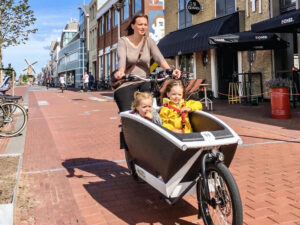
That’s because America is a suburban nation. We live in one or two story homes, each with its own lot. The distances are navigated in the rolling living room known as a car. About 93% of us get around only by car, paying 16% of our income, and roads represent 6% of government spending . Most Americans can’t conceive of any other way of living.
But e-transport lets us change the economics. It enables denser development, because electric motors can come in any size and they’re quiet, while electric vehicles can take any shape and emit no exhaust. From scooters to e-bikes, from electric wheelchairs and trikes to cars, buses, and trains, e-transport lets us take any load over any distance, scaling to fit distance, time, and space available.
In the 21st century you can order your food in, along with everything else you buy. Commercial districts are now centered around meeting places – cars, restaurants, bars – and on personal services. You don’t have to spend hours each day in a car, if you don’t want to. You can spend the money you save on a car on rent or on living.
This frightens suburban America. The idea of cities as havens of wealth and ease, rather than centers of poverty and disease, is a big one.
The fight about it centers on e-transport.
Inflexible vs. Flexible Objects

E-transport is flexible. You can have a scooter, a bike, a trike, a moped, or a wheelchair, as well as a car. Your transport can travel at 15 mph, 35 mph, or 70 mph. It can be covered, like a cart, or uncovered if you’re not made of sugar. Navigating the trade-offs is a challenge, one suburban America voted against having by electing a Trumpian government.
But e-transport is cheaper, both for cheaper and for society. The market favors e-transport. Cities, once a dumping ground for the poor, have recognized the fact and are taking halting steps to accommodate the change. With shorter distances, moreover, speeds can be made lower, and living can be safer.
The Market vs. Politics

This is why I’m going to the Netherlands. Almost half the people there now use e-transport rather than cars, including many in the middle class. But don’t be fooled. Many Dutch people remain car-heads. Outside the urban centers near the sea, the Netherlands remains a country of farms and quiet, suburban lives. There’s a lot of resistance to change.
It’s in questions of e-transport, planning for it, adapting to it, where the War Against Oil will be fought for the rest of this decade. That is why this is the story I want to follow.










